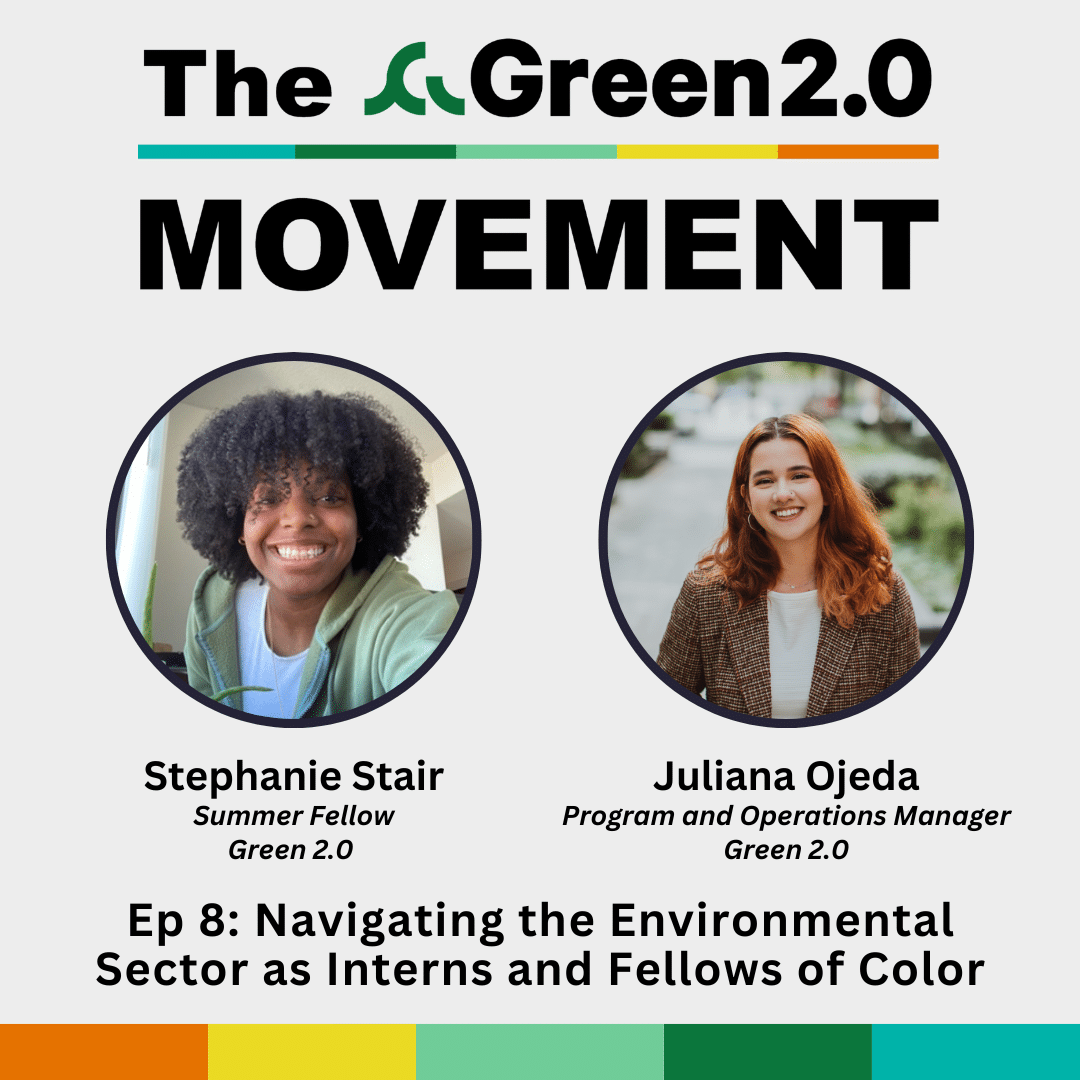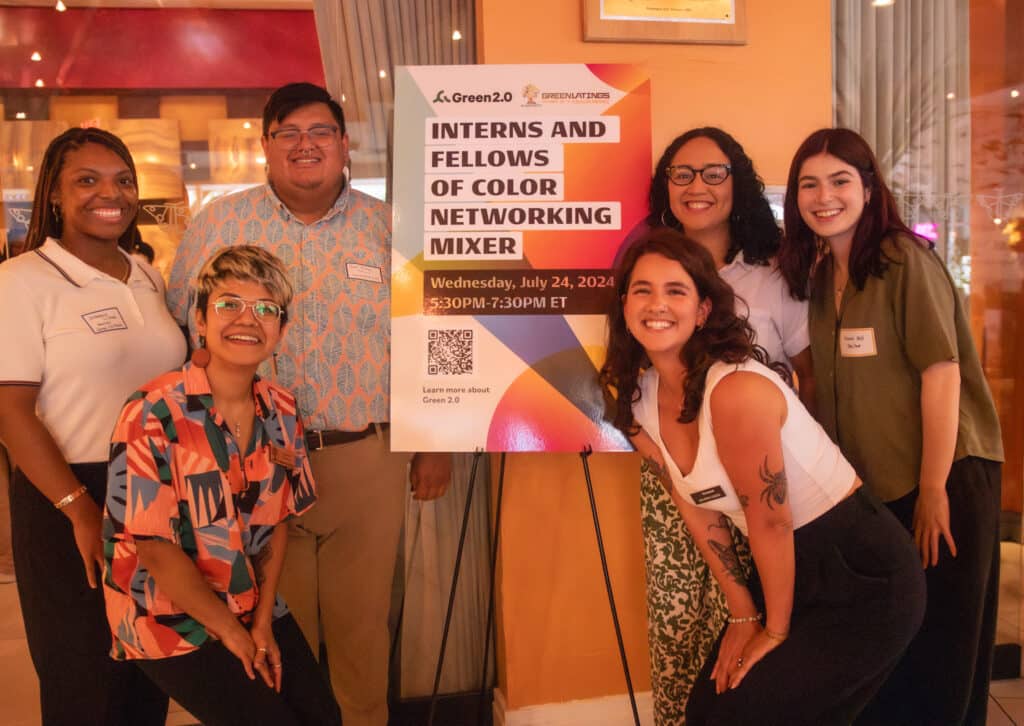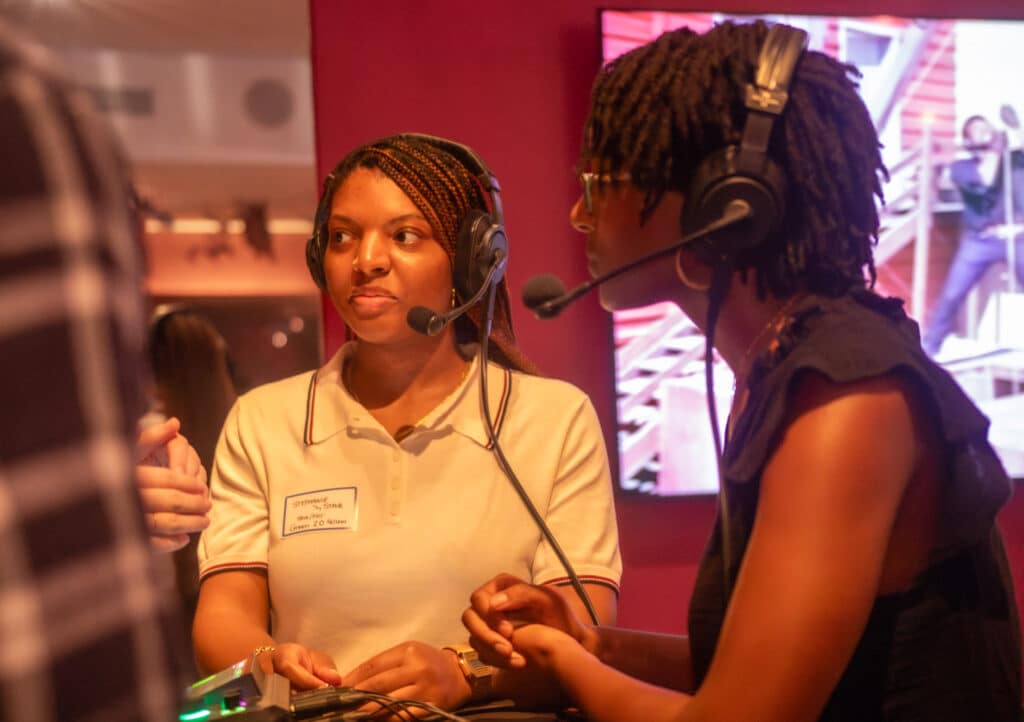Season 2
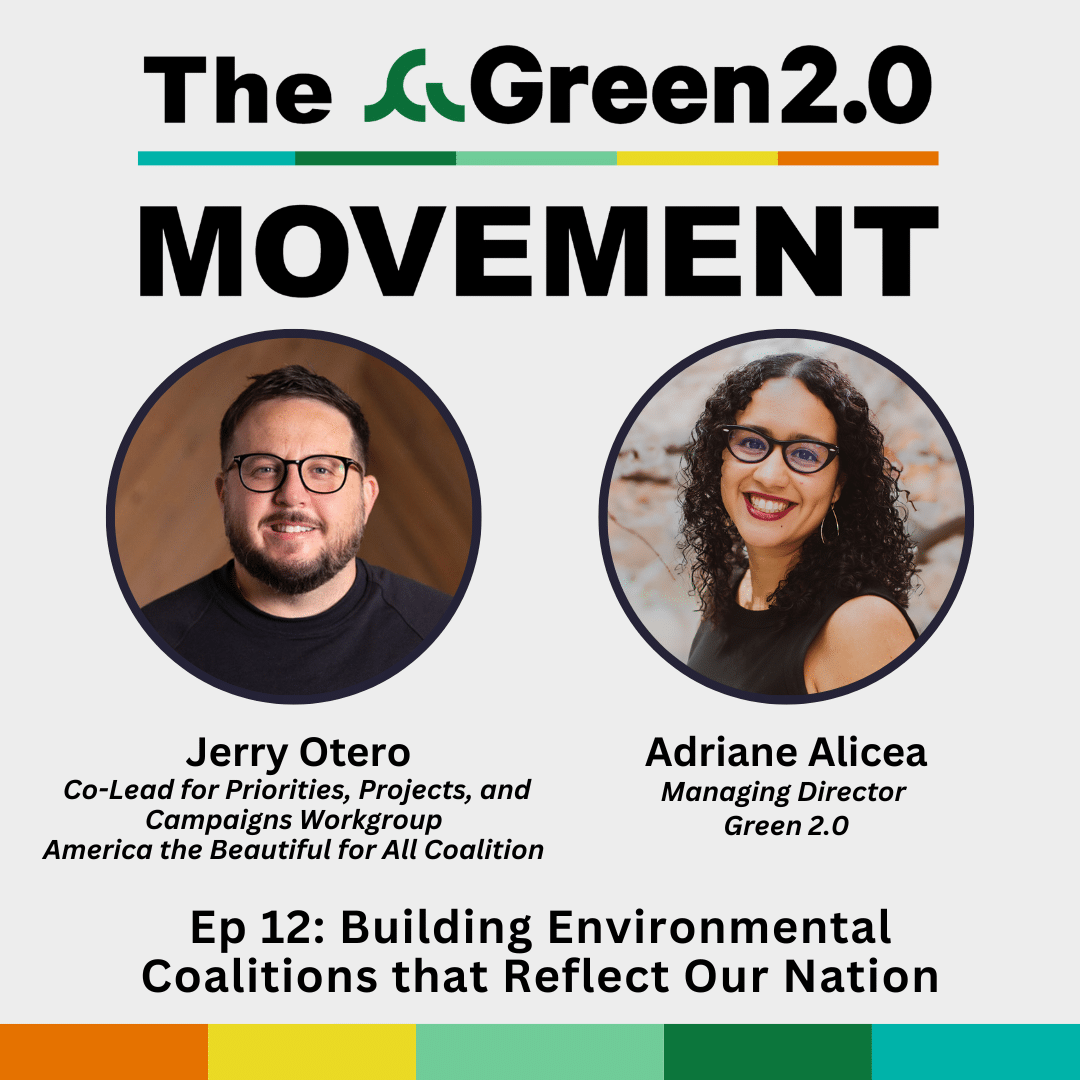
EP 12: Building Environmental Coalitions that Reflect Our Nation
In this episode, host Adriane Alicea sits down with Jerry Otero, the Policy Director at the Grand Canyon Trust and Co-Lead for Priorities, Projects, and Campaigns Workgroup at the America the Beautiful for All Coalition. They discuss how the coalition aims to achieve ambitious conservation goals that protect our lands and oceans including 30x30, what it means to build consensus, and how we can work together through environmental challenges.
Tune in to learn how the coalition fosters strategic solutions and people-centered policies through participation and true consensus.
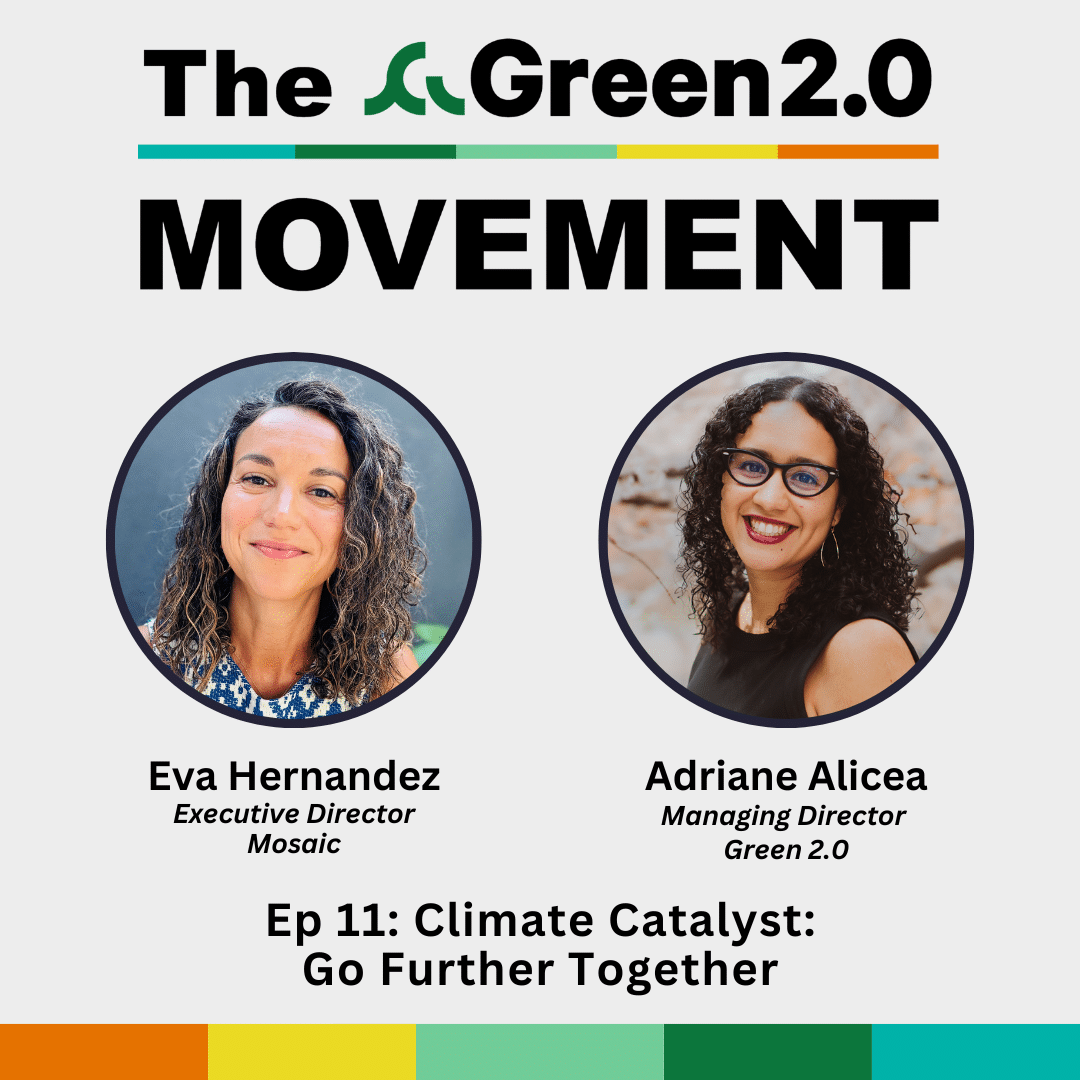
EP 11: Climate Catalyst: Go Further Together
With a vast number of organizations focused on environmental justice, building a strong network to connect advocates and organizations is essential for reaching environmental goals. Grantmakers can facilitate this by creating equitable practices, sharing resources, and connecting the dots across the sector.
In this episode, host Adriane Alicea talks with Eva Hernandez, the Executive Director of Mosaic, about how grantmakers can lead meaningful and equitable connections within the environmental sector.
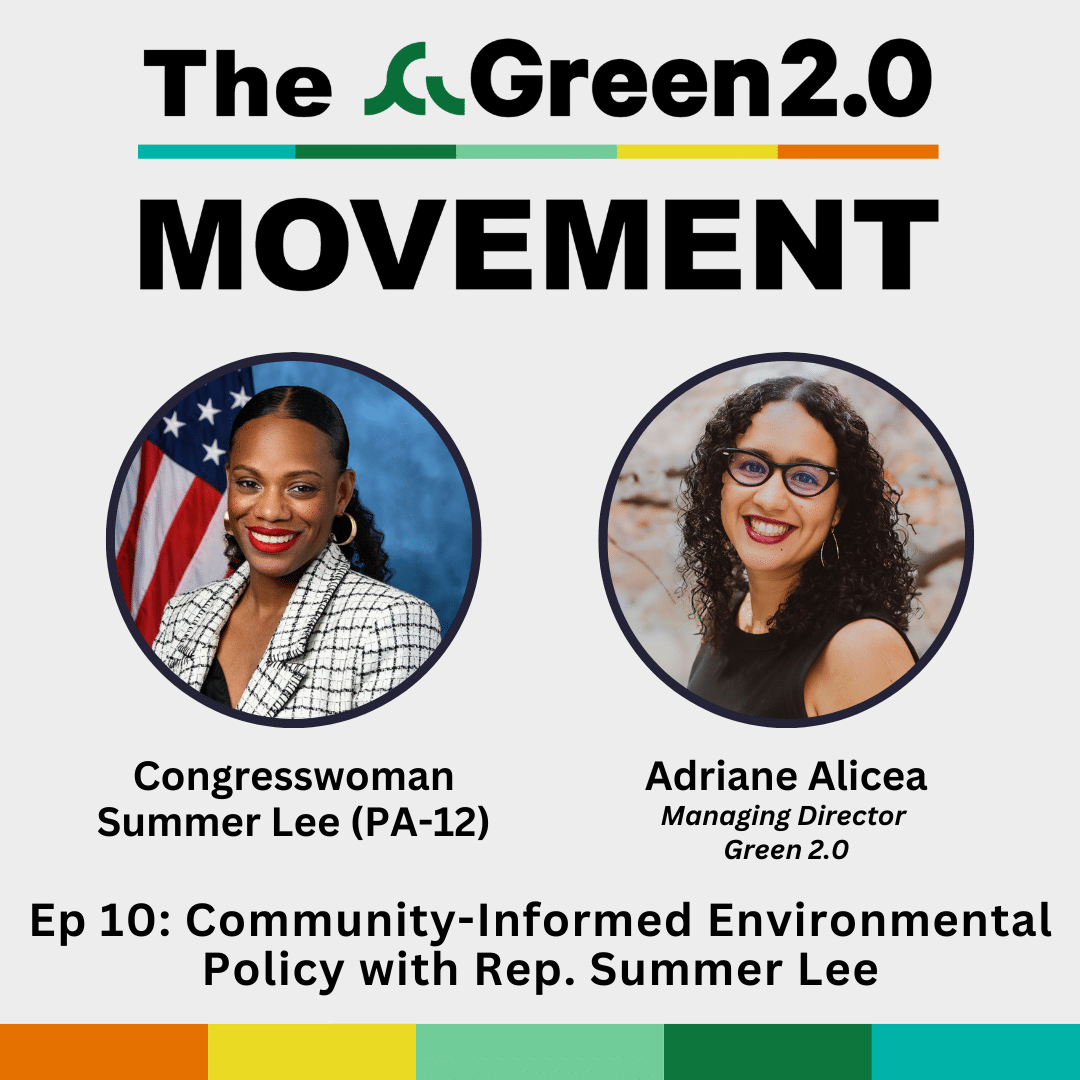
EP 10: Community-Informed Environmental Policy with Rep. Summer Lee
Communities of color have historically been left out of environmental policymaking. It has been a long and continuous journey for communities to be heard on decisions that impact their health, livelihoods, and future. Congresswoman Summer Lee is an attorney, an organizer, and most importantly someone who brings her lived experience and her community into policymaking with her. She works to bring those “closest to the pain closer to the power,” so that power is shared.
Host Adriane Alicea speaks with Congresswoman Summer Lee (PA-12) about centering impacted communities in environmental policy-making.
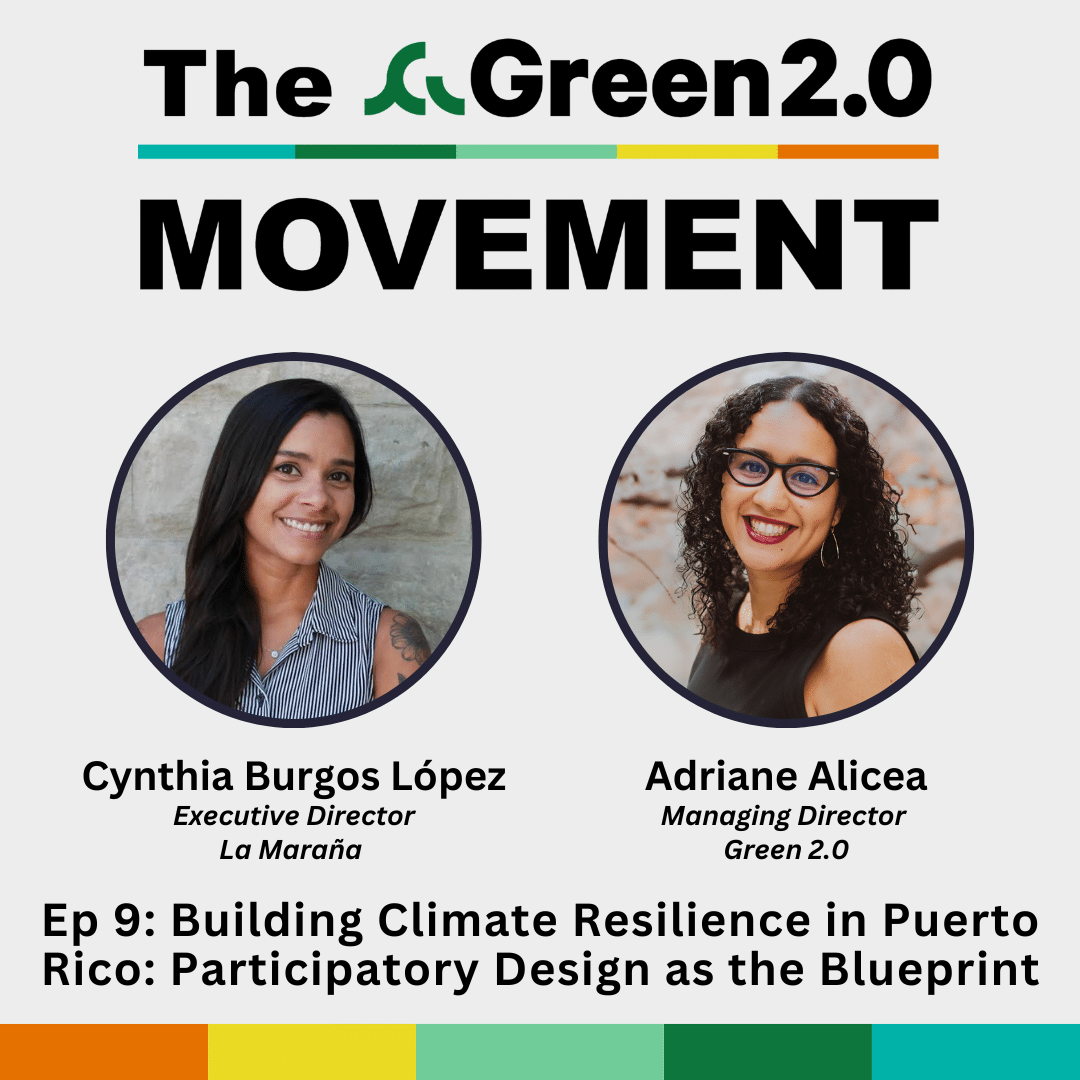
EP 9: Building Climate Resilience in Puerto Rico: Participatory Design as the Blueprint
U.S. territories are on the frontlines of climate change. In Puerto Rico climate change and policies that prioritize tourists over local communities are driving economic and social inequity. Combined with the lasting impact and ever-present threat of natural disasters, it’s clear that a new approach to climate solutions is needed, one that involves working closely with local communities to understand their needs and create more resilient environments.
Host Adriane Alicea speaks with Cynthia Burgos López, the Executive Director of La Maraña, about how the organization is building a movement to support food sovereignty and climate resilience in Puerto Rico.
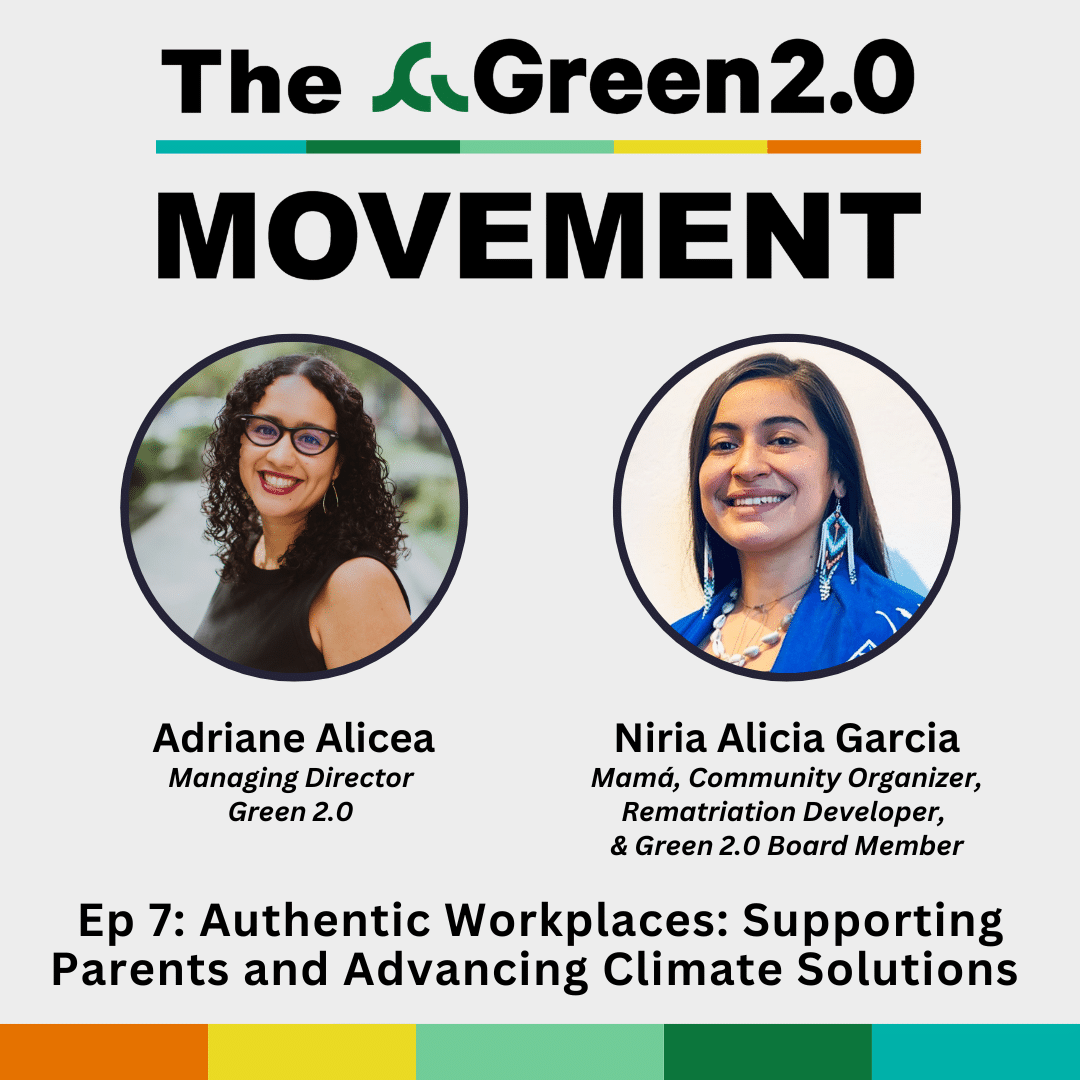
EP 7: Authentic Workplaces: Supporting Parents and Advancing Climate Solutions
The U.S. has a problem providing paid time off for caretakers, especially when it comes to parents. Since paid parental leave is left to employers, many parents aren’t guaranteed adequate time off to care for their families. In the environmental sector, organizations provide on average only 8 weeks of paid parental leave, while some offer none at all.
Green 2.0's Managing Director Adriane Alicea sits down with Niria Alicia Garcia, Mamá, Community Organizer, Rematriation Developer, and Green 2.0 Board Member, to discuss how environmental organizations can create workplaces that support parents and families.
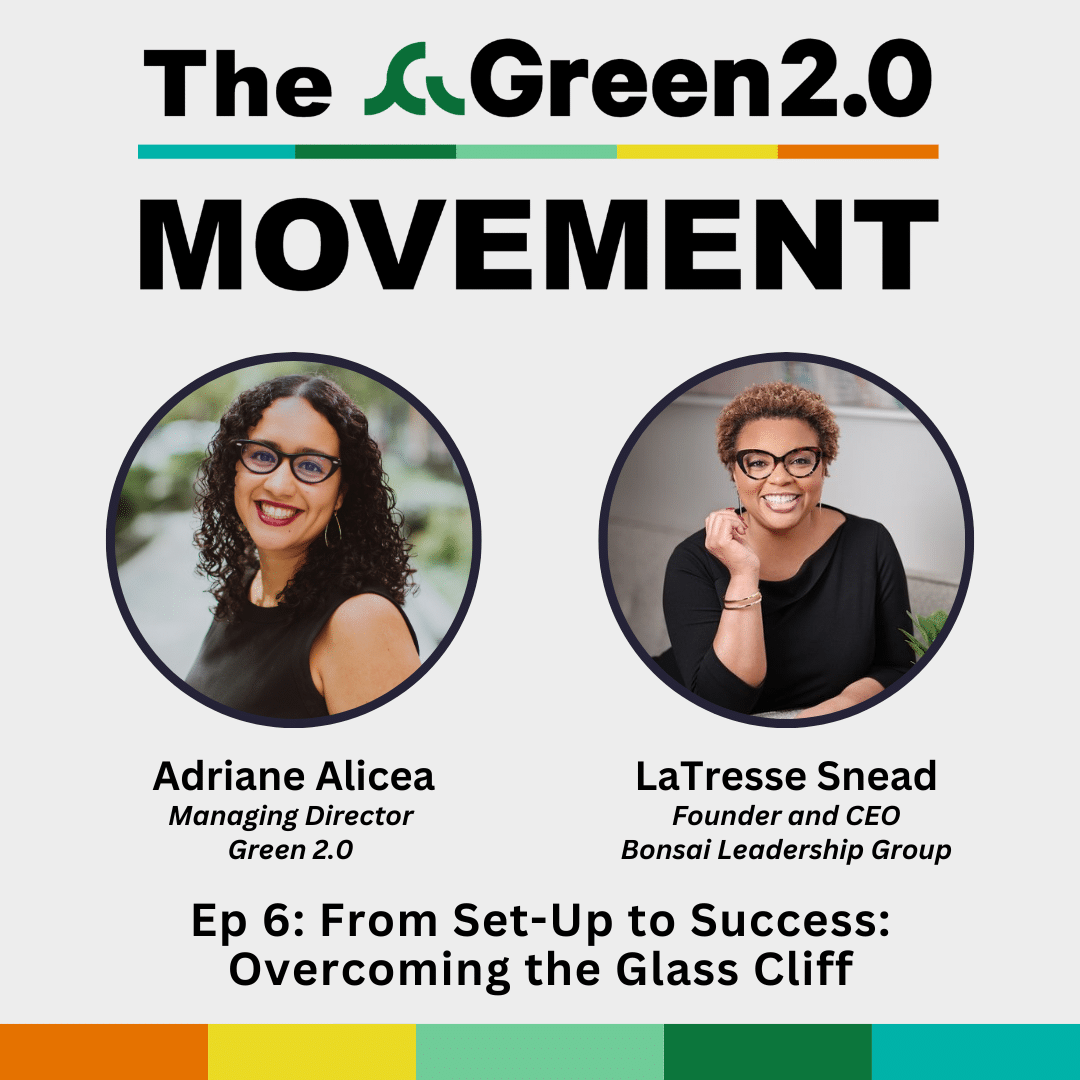
EP 6: From Set-Up to Success: Overcoming the Glass Cliff
The glass cliff is a phenomenon where women and people of color are promoted to leadership positions, often during times of crisis, without the resources they need to succeed. It allows organizations to appear more diverse without making institutional and cultural changes truly needed.
Adriane sits down with LaTresse Snead, Founder of Bonsai Leadership Group, to examine the challenges facing environmental leaders who find themselves on the glass cliff and explore strategies for providing more effective support.
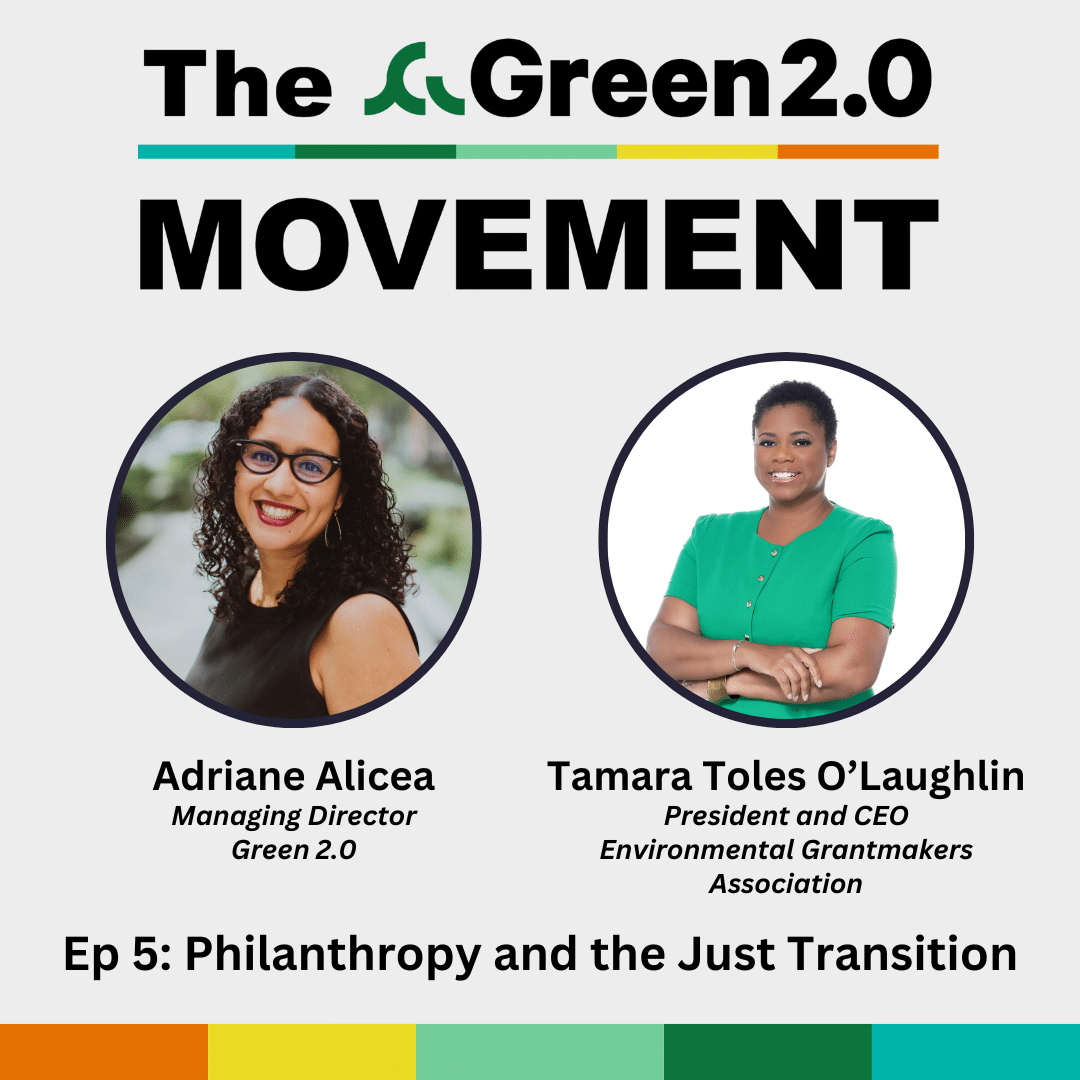
EP 5: Philanthropy and the Just Transition
Funders can play a key role in the advancement of justice by facilitating a more equitable distribution of resources. It is essential for philanthropy to be intentional about where their funding is deployed.
Tamara Toles O’Laughlin, President and CEO of the Environmental Grantmakers Association and Founder of Climate Critical, speaks on what it will take to usher in the just transition and encourages individual donors to ask questions about the outcomes of their support.
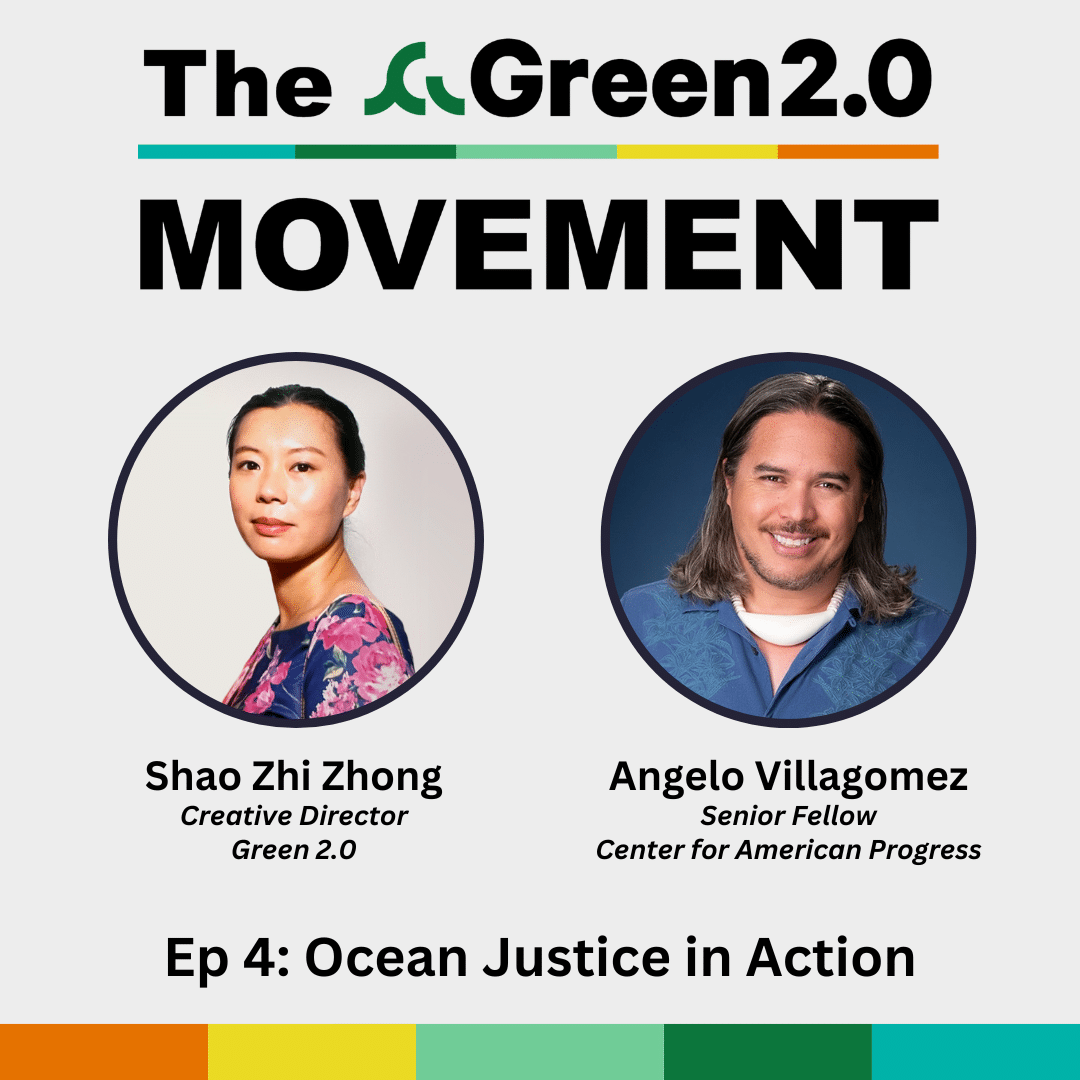
EP 4: Ocean Justice In Action
Ocean justice exists at the intersection of social inclusion, ocean stewardship, and justice. It means harnessing the full participation of historically excluded communities. Indigenous people and communities of color bear the economic and social burden of climate change and conservation efforts, often without receiving the benefits.
In this episode of The Green 2.0 Movement, host Shao Zhi Zhong talks to Angelo Villagomez, a Senior Fellow at the Center for American Progress, about how we can strengthen the conservation movement and challenge colonial legacies through Indigenous knowledge and values.
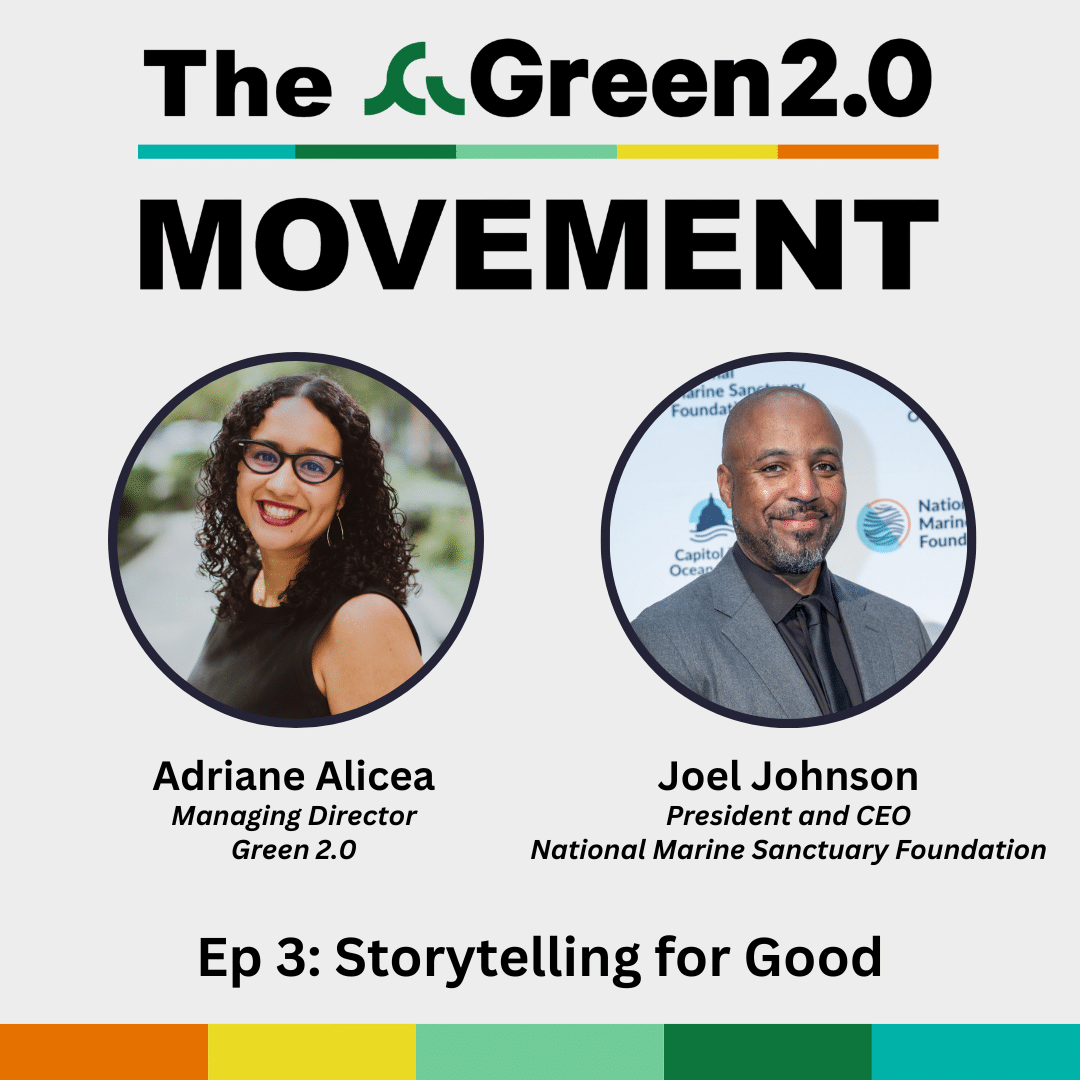
EP 3: Storytelling for Good
The environmental movement needs storytellers to reach our goals and inspire meaningful action — storytellers like Joel Johnson, President and CEO of the National Marine Sanctuary Foundation.
In this episode, Joel offers a glimpse into his personal environmental journey. Alongside Green 2.0’s Managing Director Adriane Alicea, he emphasizes his commitment to harnessing the power of storytelling to build bridges across communities and advance environmental justice.
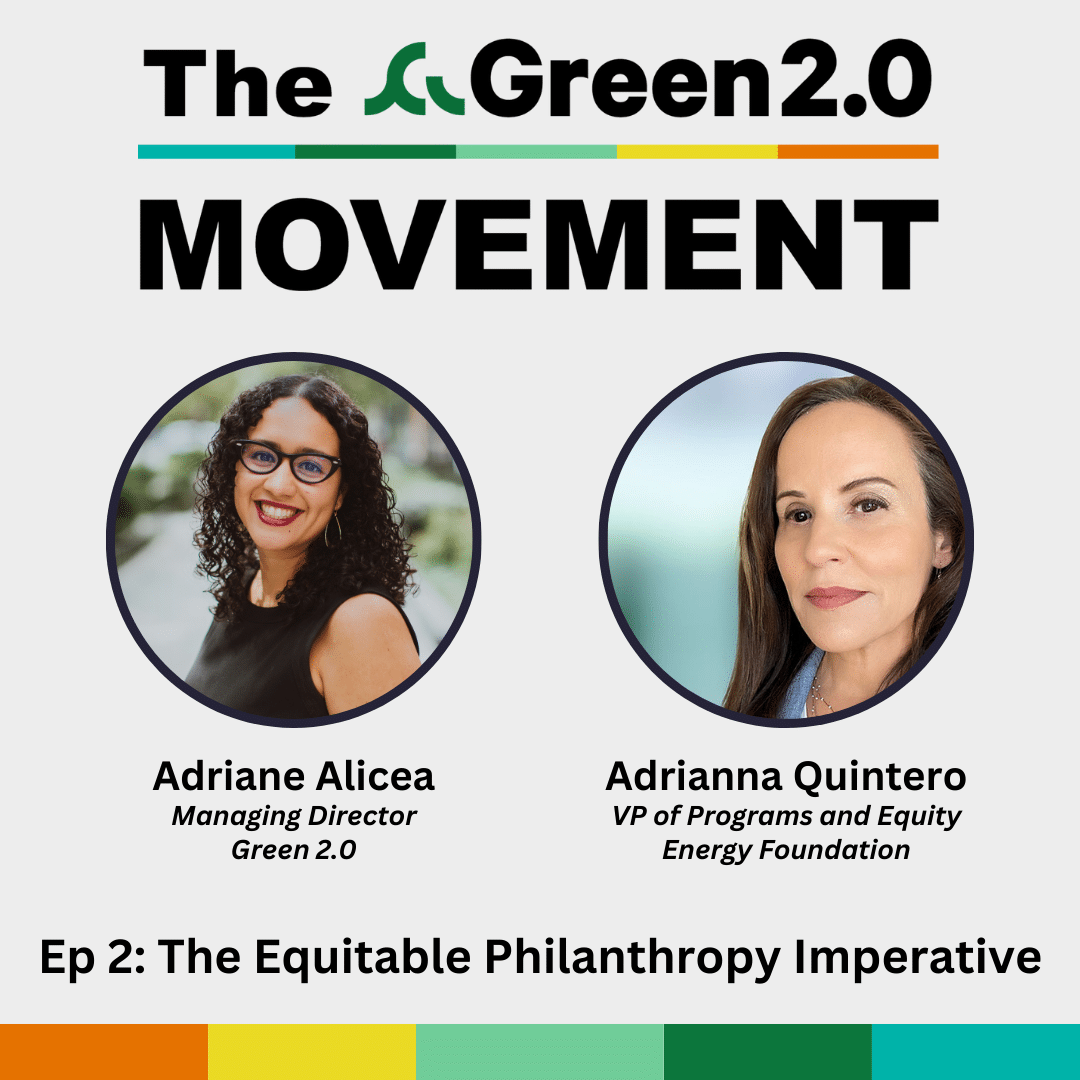
EP 2: The Equitable Philanthropy Imperative
Despite recent progress in equitable grantmaking practices, funders are taking a step back from DEIJ work in 2024. If this continues, communities most impacted by climate change will not receive the funding and representation they need from philanthropy to secure their future.
Adrianna Quintero is Vice President of Programs and Equity at Energy Foundation and has built the organization’s DEIJ program from the ground up. She speaks with Green 2.0’s Adriane Alicea on how community-responsive grantmaking is both morally and strategically essential for the success of the environmental justice movement.
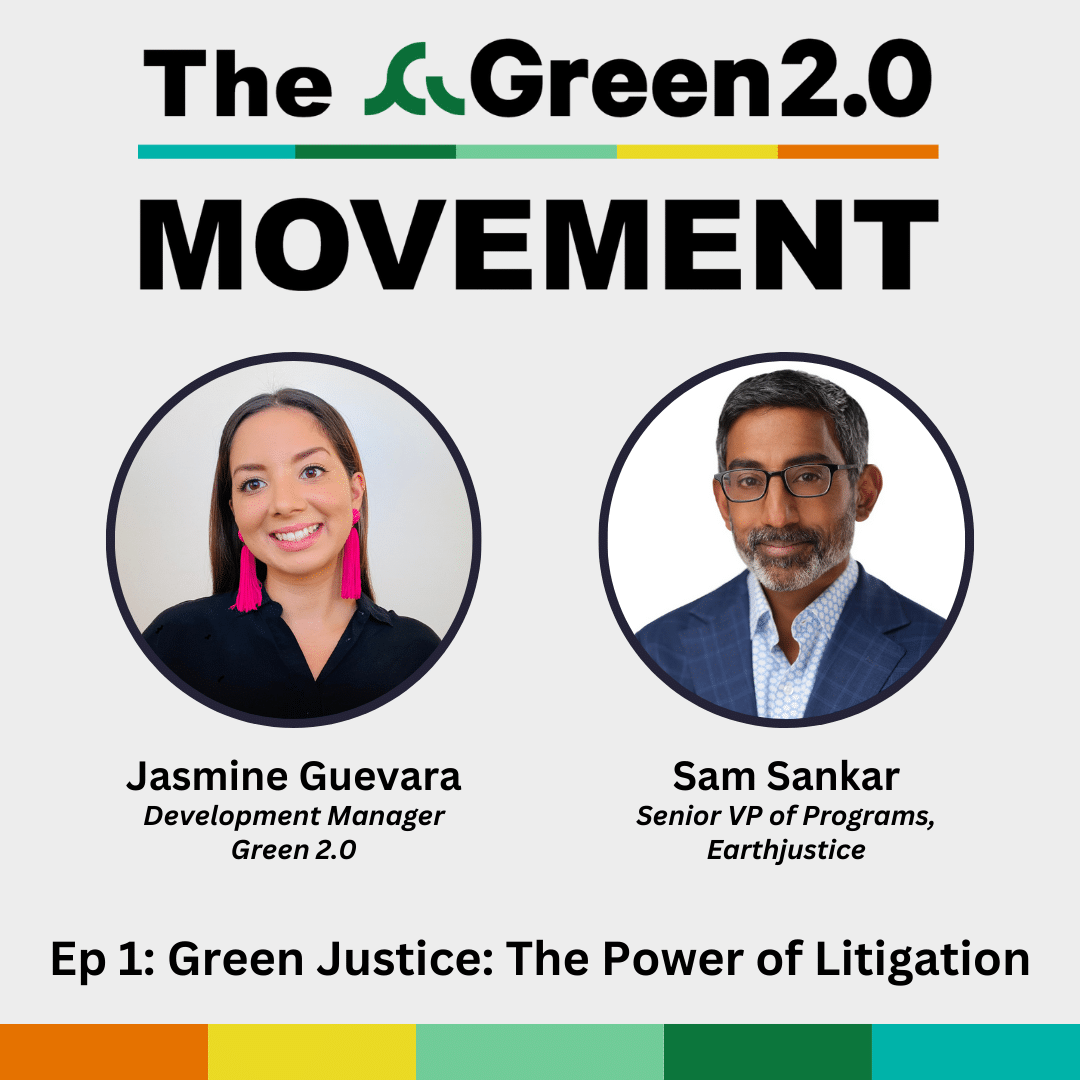
EP 1: Green Justice: The Power of Litigation
Litigation can hold companies, governments, and individuals accountable when environmental laws are broken, and communities are harmed. As climate change affects a wider range of the population, more lawsuits are filed to protect people. Therefore, activist groups that aren’t strictly defined by climate become a part of the environmental movement. This conversation dives into how environmental litigation can protect communities and the land they live on.
In the first episode of season 2 of The Green 2.0 Movement, Green 2.0’s Jasmine Guevara speaks with environmental attorney Sam Sankar, Senior Vice President of Programs at Earthjustice, about the role environmental litigation plays in advancing environmental justice and building bridges across movements in light of climate change’s growing impact on every part of our lives.
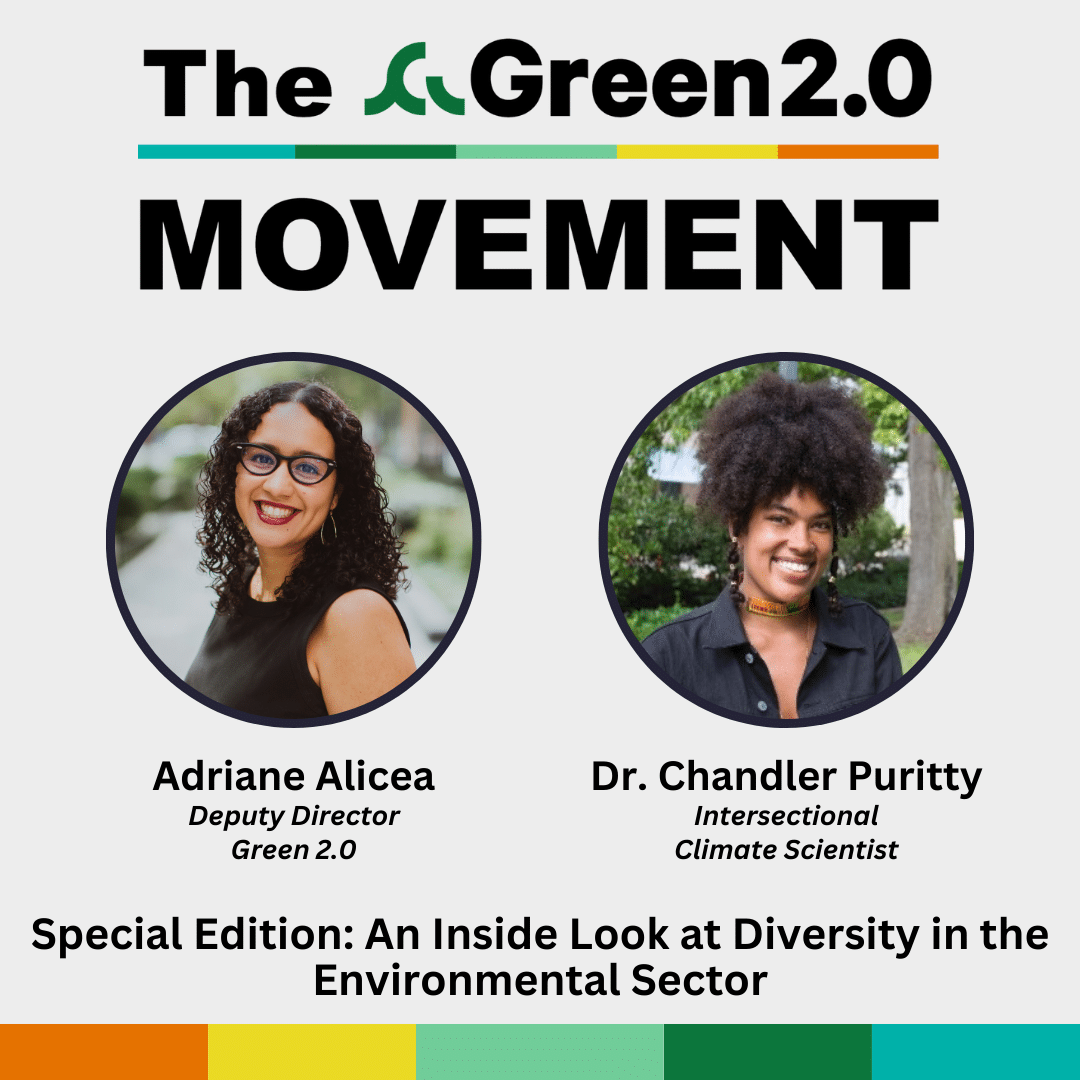
Special Edition: An Inside Look at Diversity in the Environmental Sector
This special edition episode of The Green 2.0 Movement brings together the voices of experts who helped launch the 2023 NGO and Foundation Transparency Report Card, which is an annual report released by Green 2.0 to track major gaps in DEIJ within NGOs and foundations in the environmental sector.
Adriane Alicea, Green 2.0’s Deputy Director, has a candid conversation with Dr. Chandler Puritty, an intersectional climate scientist. Listen to this episode for notable moments from the Report Card launch event and reflections on how to promote transparency and accountability in the environmental sector.
Season 1
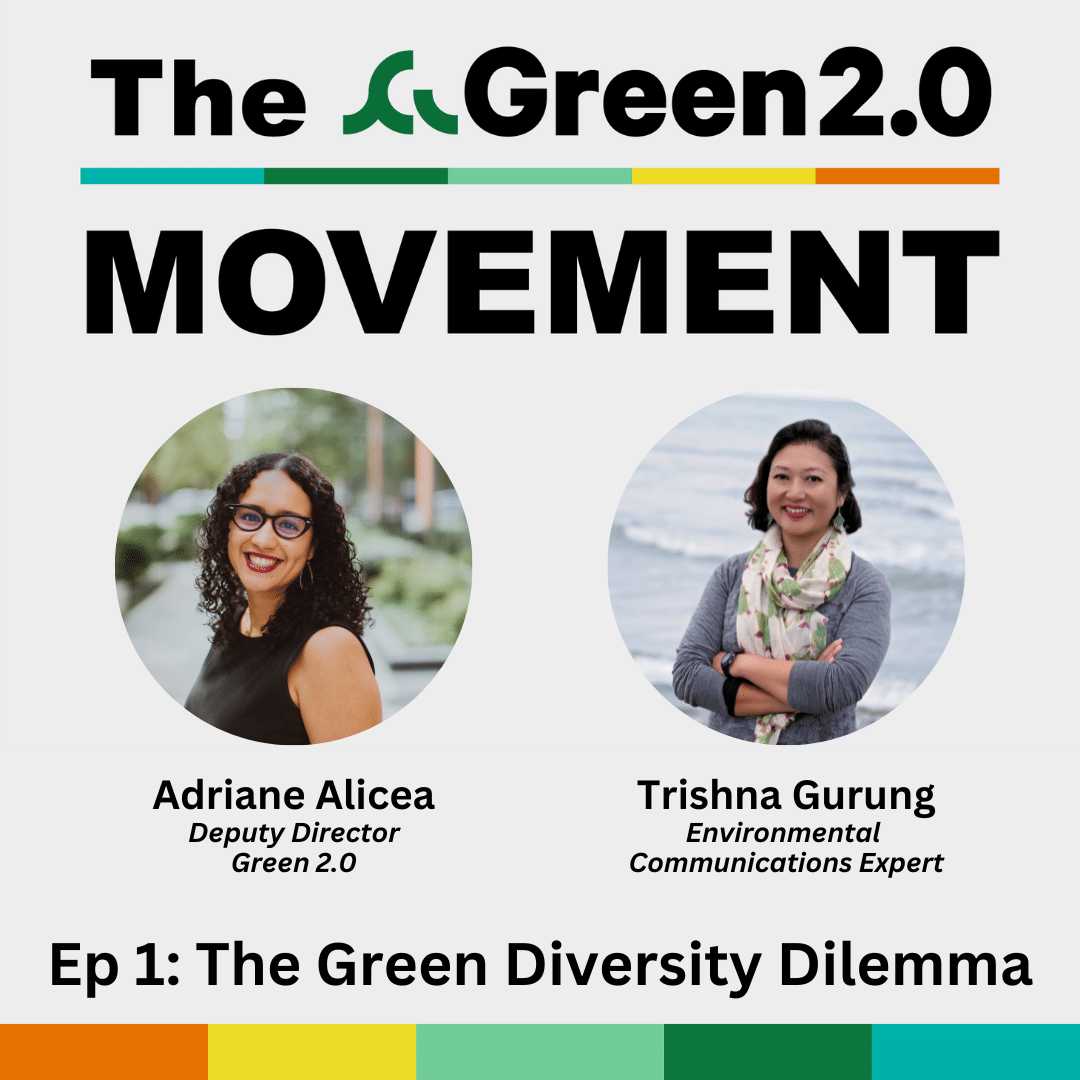
EP 1: The Green Diversity Dilemma
We know climate change impacts people of color the most. But environmental NGOs and foundations have been slow to reflect that in their hiring. This blocks the path to the c-suite for people from diverse racial and ethnic backgrounds, according to Green 2.0’s 2022 Transparency Report Card.
Green 2.0 Deputy Director Adriane Alicea examines this problem with Trishna Gurung, a Washington, D.C.-based communications professional who brings her lived experience as a woman of color and immigrant to her passion for storytelling and advocacy campaigns. Together, they explore the findings of the report card and discuss how to change workplace cultures to better promote and retain leaders from diverse backgrounds.
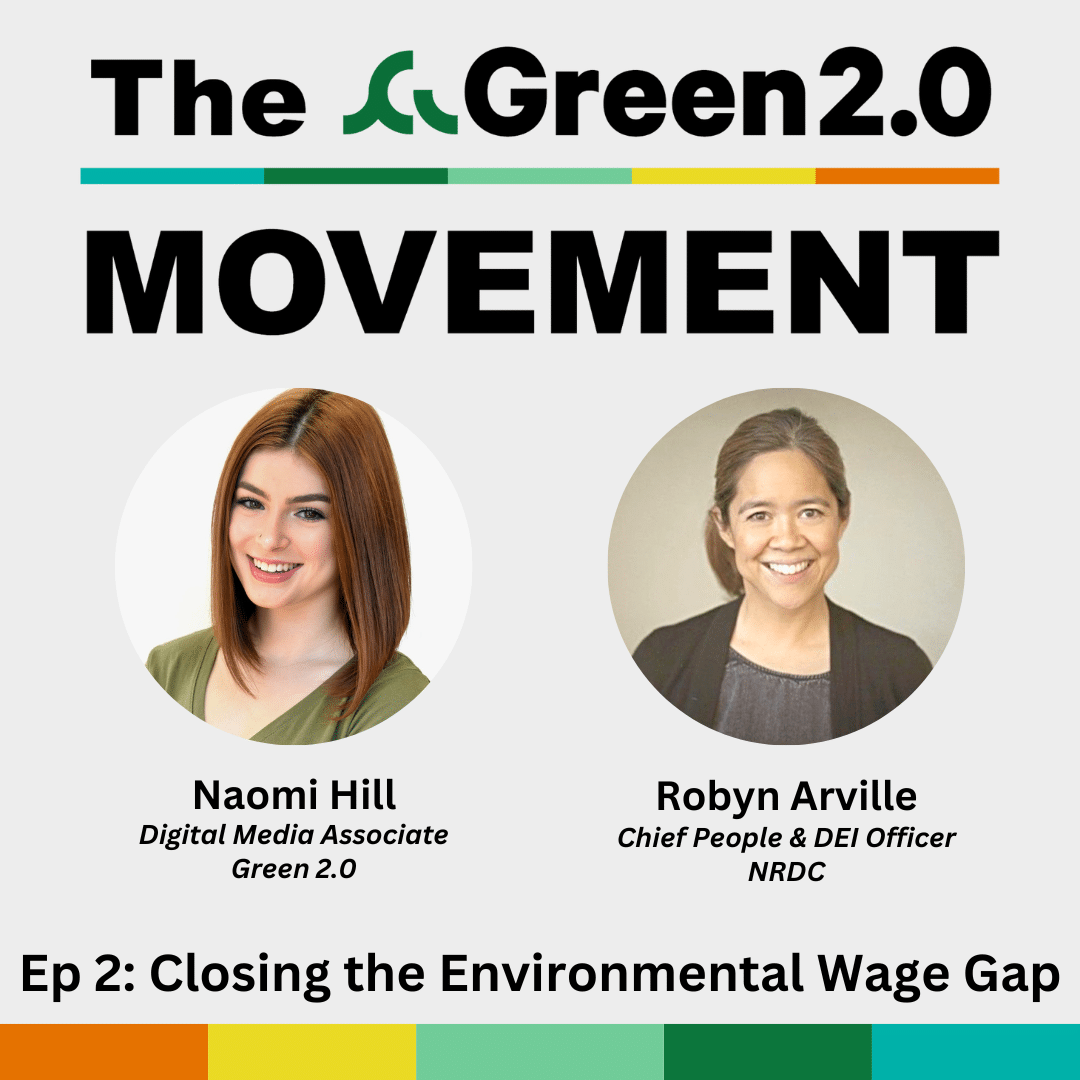
EP 2: Closing the Environmental Wage Gap
Employees’ salaries are not always indicative of their ability to do their job. Many workers, especially women of color, face pay disparities based on gender, race, or ethnicity. That’s why Green 2.0 created the Pay Equity Pledge to challenge every environmental organization to analyze if their staff is paid equitably.
Green 2.0 Digital Media Associate Naomi Hill examines the problem with Robyn Arville, Chief People and DEI Officer at the Natural Resources Defense Council (NRDC), a pledge participant. They discuss why it's critical for environmental organizations to promote diversity, equity, inclusion, and justice through their internal practices.
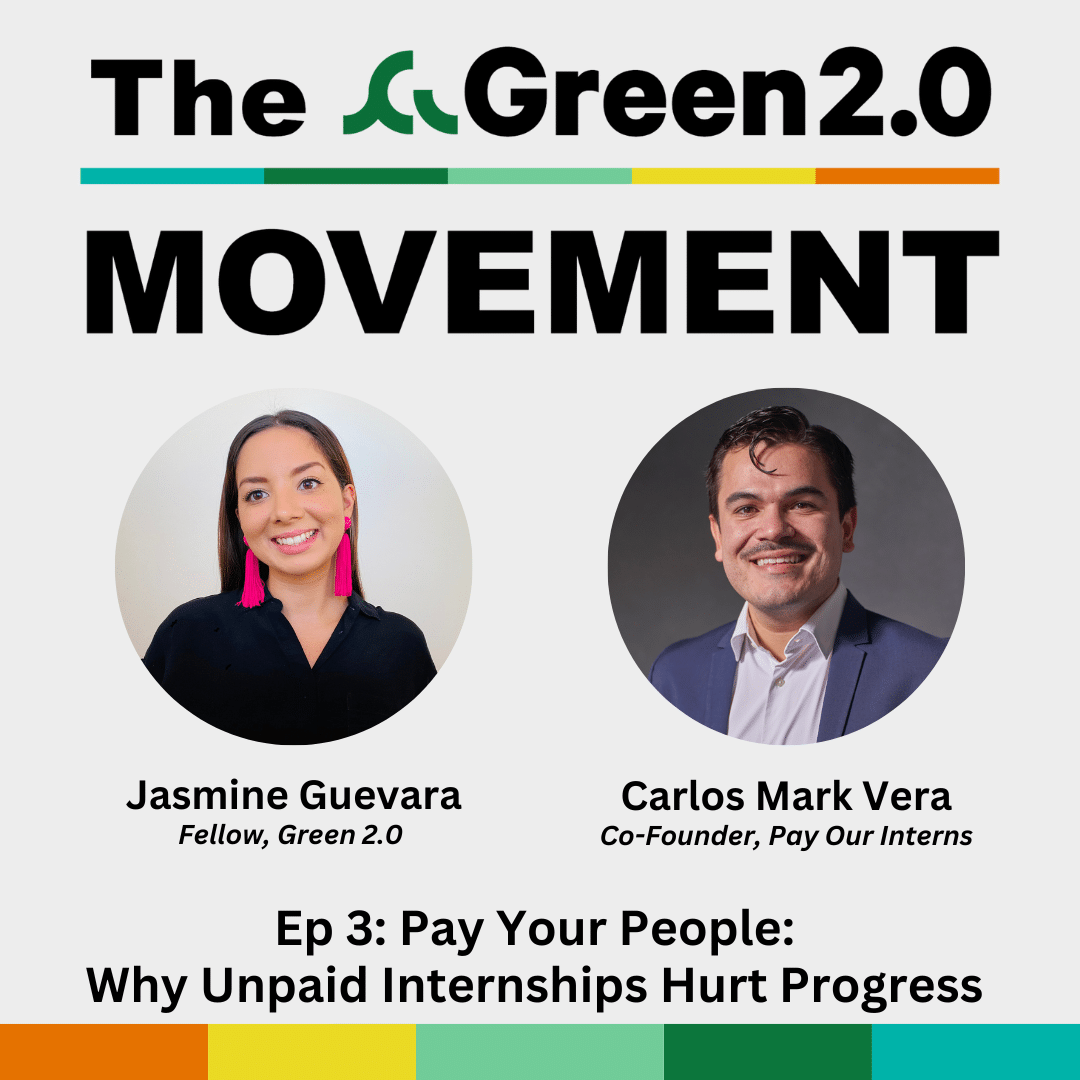
EP 3: Pay Your People: Why Unpaid Internships Hurt Progress
Internships offer the opportunity for young professionals to kickstart their careers. But when the position is unpaid, it limits the hiring pool to those who can afford to work for free. Asking people to work for free counteracts the positive work of environmental organizations and keeps people of color from applying for these positions.
Green 2.0 Fellow Jasmine Guevara sits down with Carlos Mark Vera, Co-Founder of Pay Our Interns, to discuss how unpaid internships perpetuate socioeconomic barriers and what can be done to create more equitable employment opportunities.
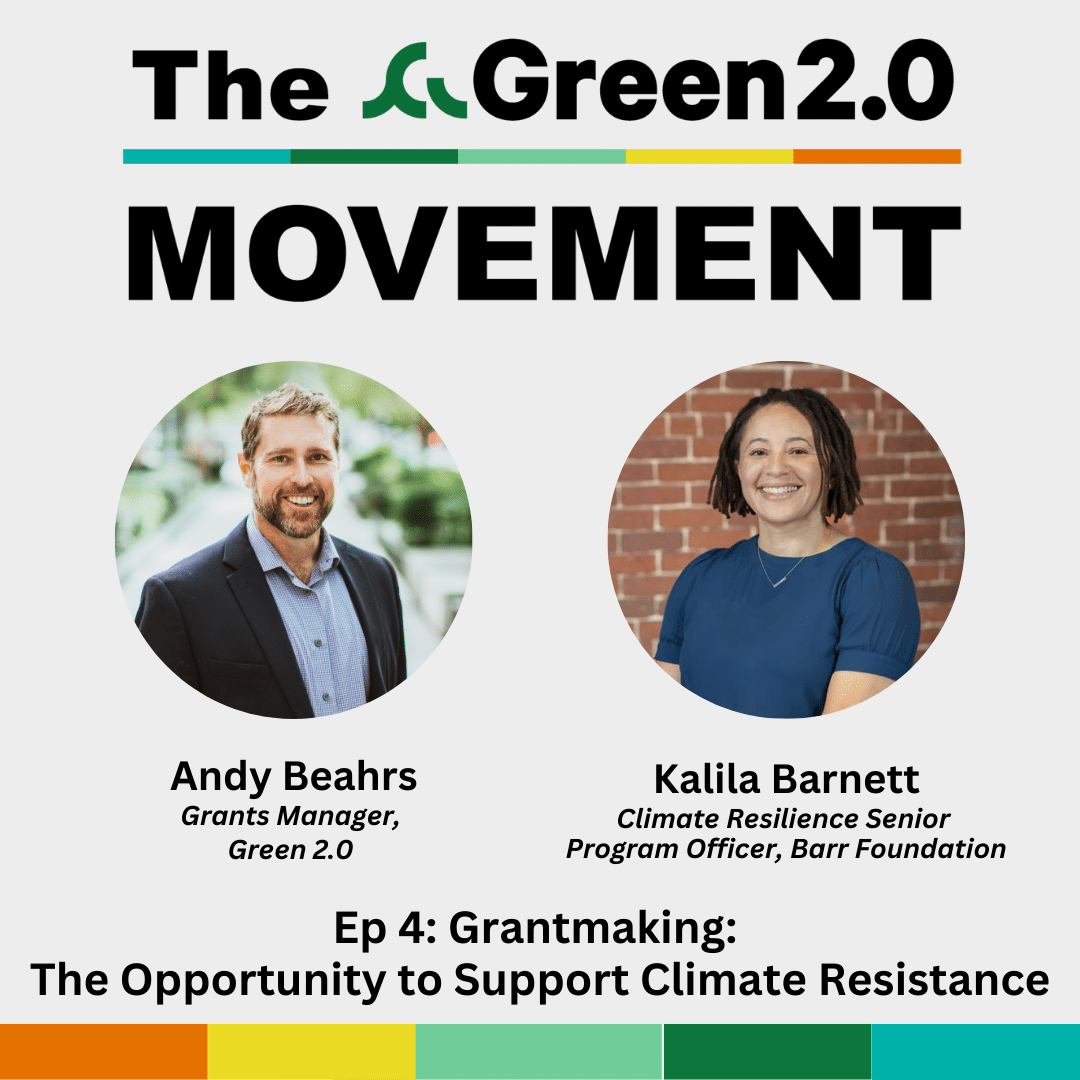
EP 4: Grantmaking: The Opportunity to Support Climate Resilience
Environmental grantmaking creates opportunities to make meaningful changes for our planet. But many organizations that receive grants lack diversity. In order to create environmental solutions that align with the needs of those most impacted by climate change, diverse voices need to receive an equitable allocation of grant money.
Andy Beahrs, the Grants Manager at Green 2.0, sits down with Kalila Barnett, the Climate Resilience Senior Program Officer at the Barr Foundation, to discuss promoting equity in environmental grantmaking.
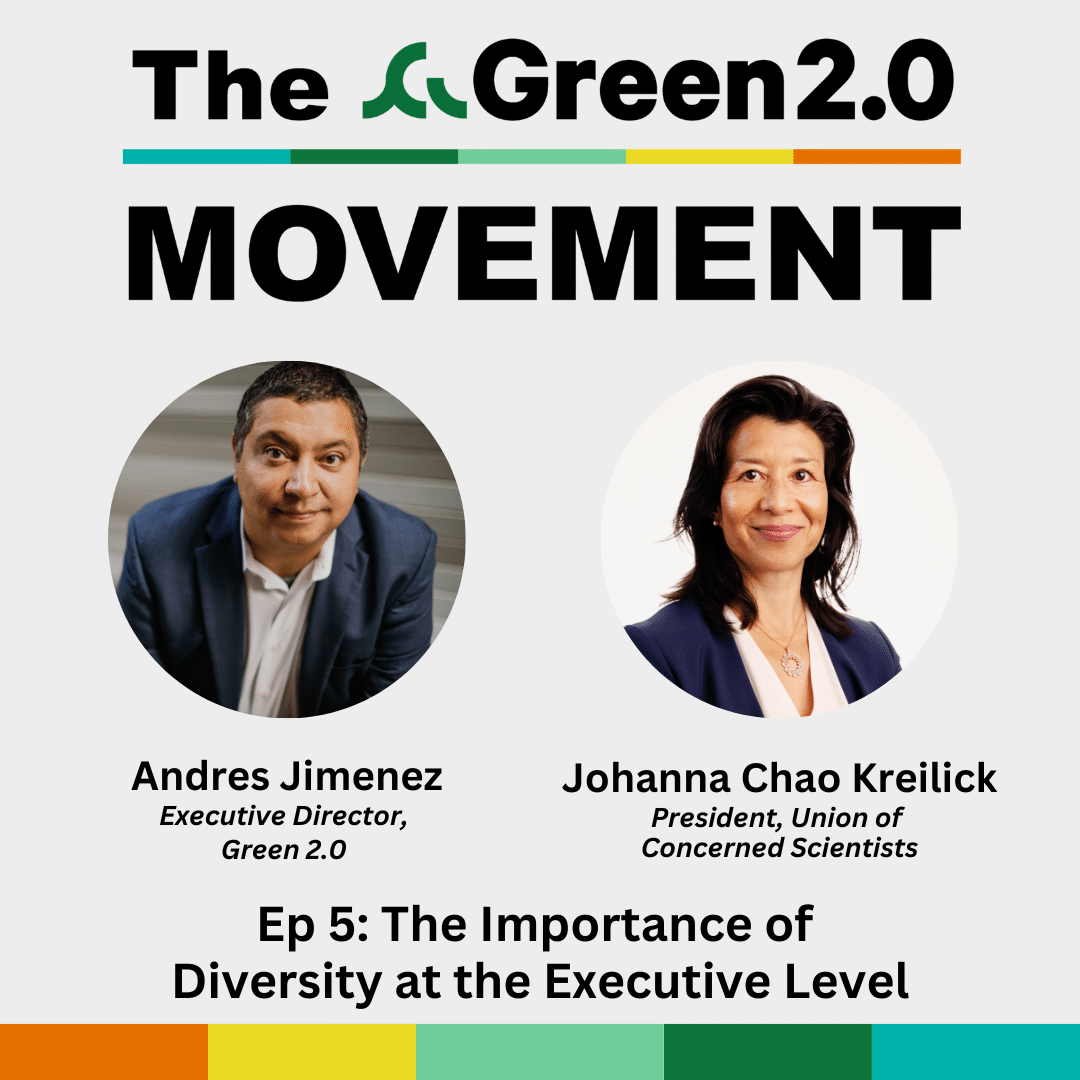
EP 5: The Importance of Executive Diversity
Diverse leadership is critical to a successful climate change movement. However, Green 2.0’s 2022 Transparency Report Card shows that the majority of executive leadership positions are held by white people.
Andres Jimenez, the Executive Director of Green 2.0, sits down with Johanna Chao Kreilick, President of the Union of Concerned Scientists, to discuss how identity impacts leadership and actionable steps to create more inclusive environmental organizations.
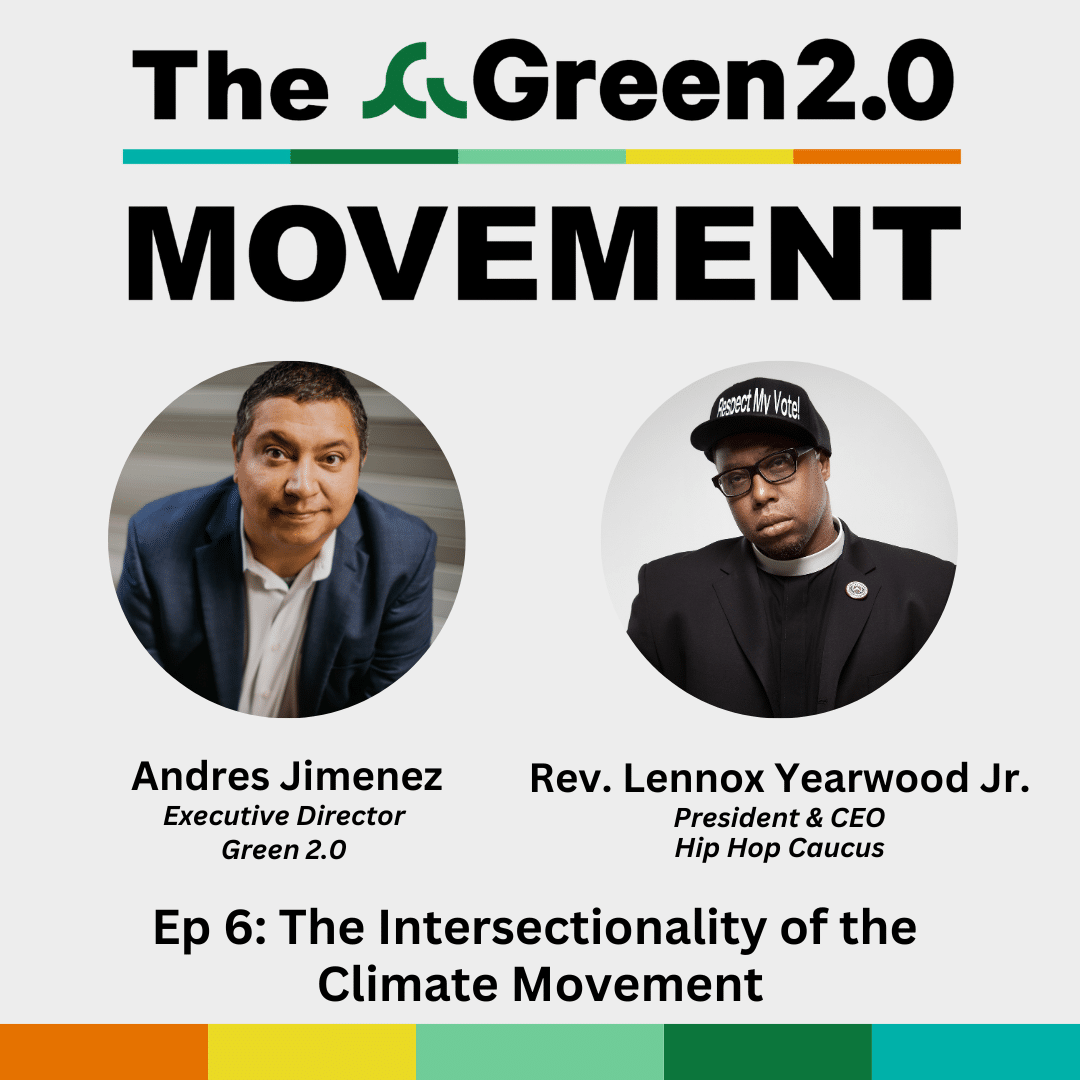
EP 6: The Intersectionality of the Climate Movement
When racial justice is centered in climate work, it ensures that those most impacted by climate change are leading the solutions. That change starts when the voices of people of color are placed in decision-making roles and philanthropy becomes more responsive to those Communities. Reverend Lennox Yearwood Jr., President and CEO of the Hip Hop Caucus and Green 2.0 board chair, joins Andres Jimenez, Executive Director of Green 2.0, to talk about shaping an environmental movement rooted in lived experiences.
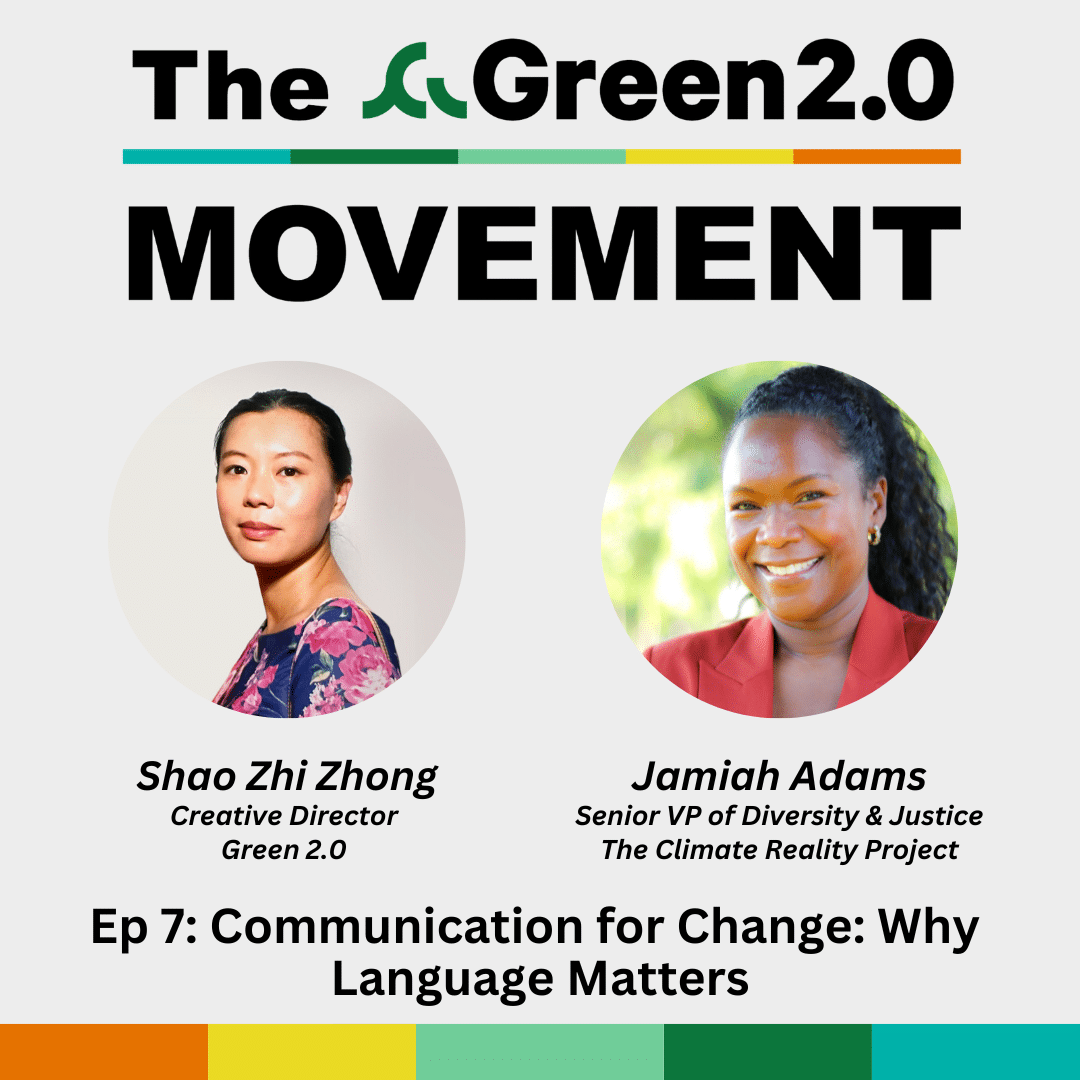
EP 7: Communication for Change: Why Language Matters
Environmental organizations and foundations have to center diversity, equity, inclusion, and justice (DEIJ) to create environmentally just solutions for all. Inclusive language and equitable hiring practices can be building blocks to a more diverse and equitable environmental movement.
Jamiah Adams, the Senior Vice President of Diversity and Justice for the Climate Reality Project, and Shao Zhi Zhong, Creative Director at Green 2.0, walk through embracing and communicating DEIJ values and goals.
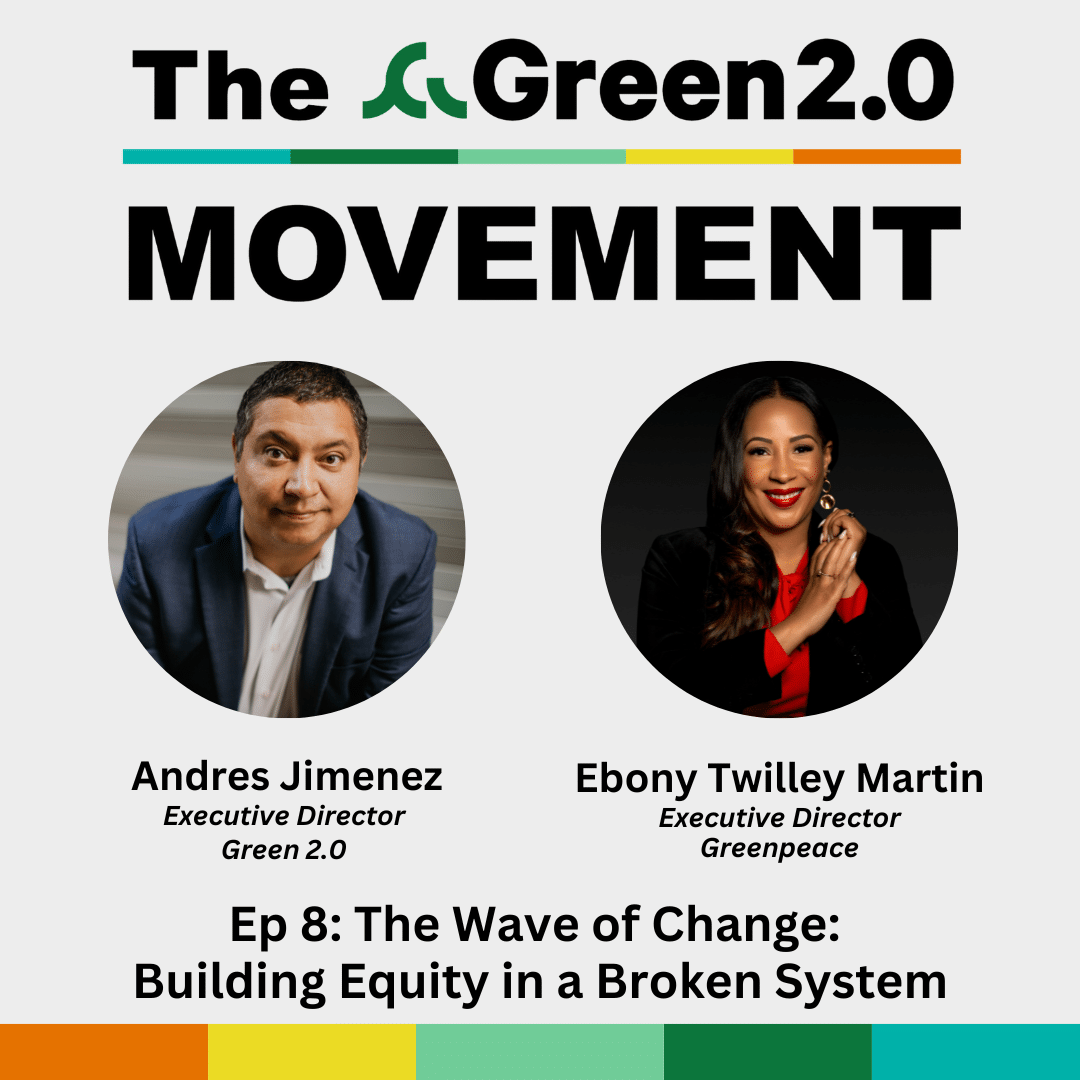
EP 8: The Wave of Change: Building Equity in a Broken System
The culture and core values of environmental organizations and foundations inform every part of their work. Before meaningful action can really begin, there needs to be a foundation of diversity, equity, inclusion, and justice. That way, there’s an opportunity to create impactful racial and environmental justice initiatives. But how do we restructure organizations with these pillars in mind?
Andres Jimenez, the Executive Director of Green 2.0, chats with Ebony Twilley Martin, Executive Director of Greenpeace, about her journey to the C-Suite and what it takes to make meaningful changes in organizations.
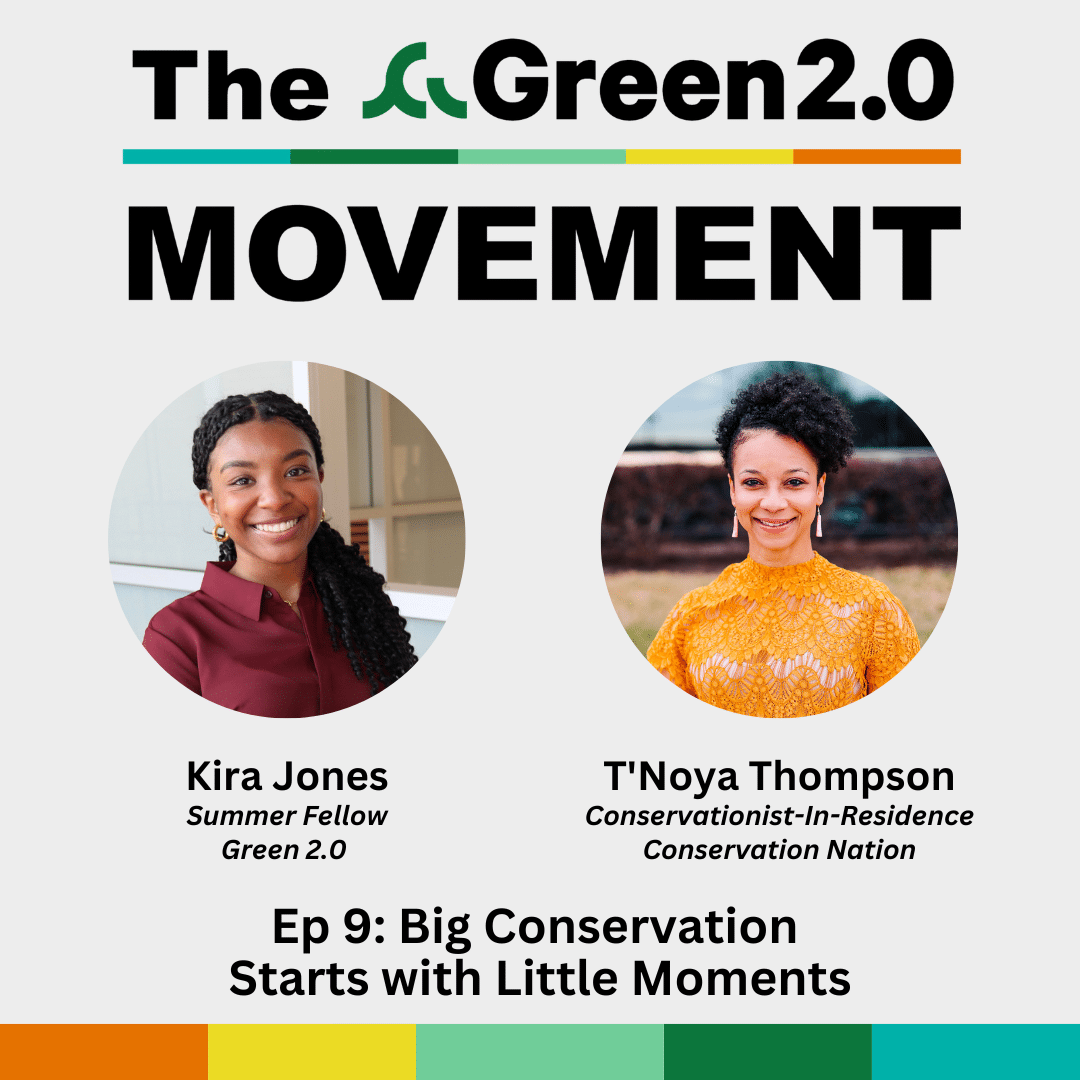
EP 9: Big Conservation Starts with Little Moments
It’s crucial that the conservation movement be led and informed by people and communities who have lived experience and connection to the land. But many conservation groups are lacking employees or volunteers from communities of color.
Kira Jones, a Green 2.0 fellow, speaks with T'Noya Thompson, a Conservationist-In-Residence at Conservation Nation, on how to nurture inclusivity in the conservation movement and dismantle the barriers preventing people of color from entering conservation spaces.
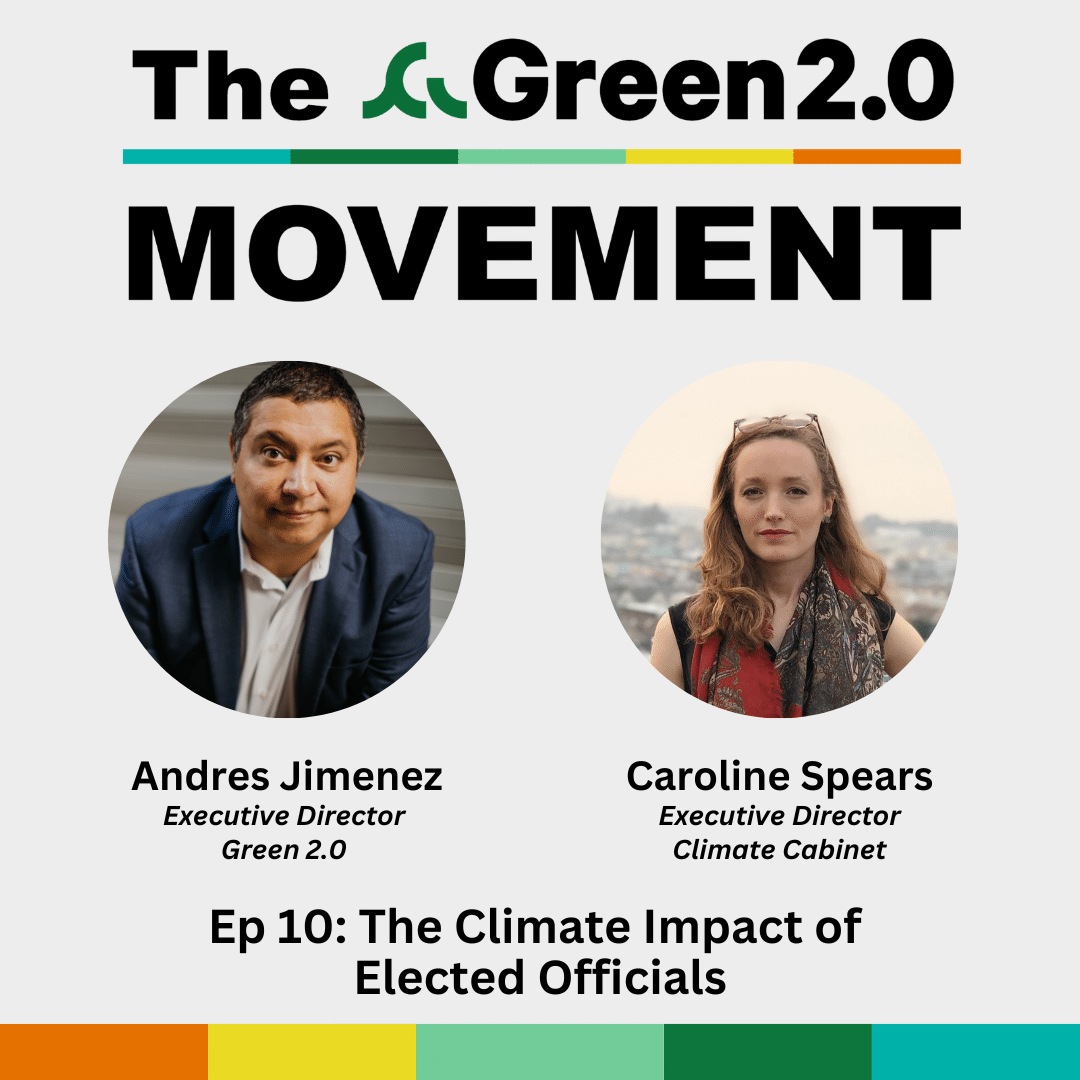
EP 10: The Climate Impact of Elected Officials
Elected officials have the opportunity to address climate change on a local and national level. Candidates who care deeply about climate change and racial justice become elected officials who prioritize policies that protect our communities and our planet.
Andres Jimenez, the Executive Director of Green 2.0, speaks with Caroline Spears, the Executive Director of Climate Cabinet, about how the organization is changing how we prioritize climate change.
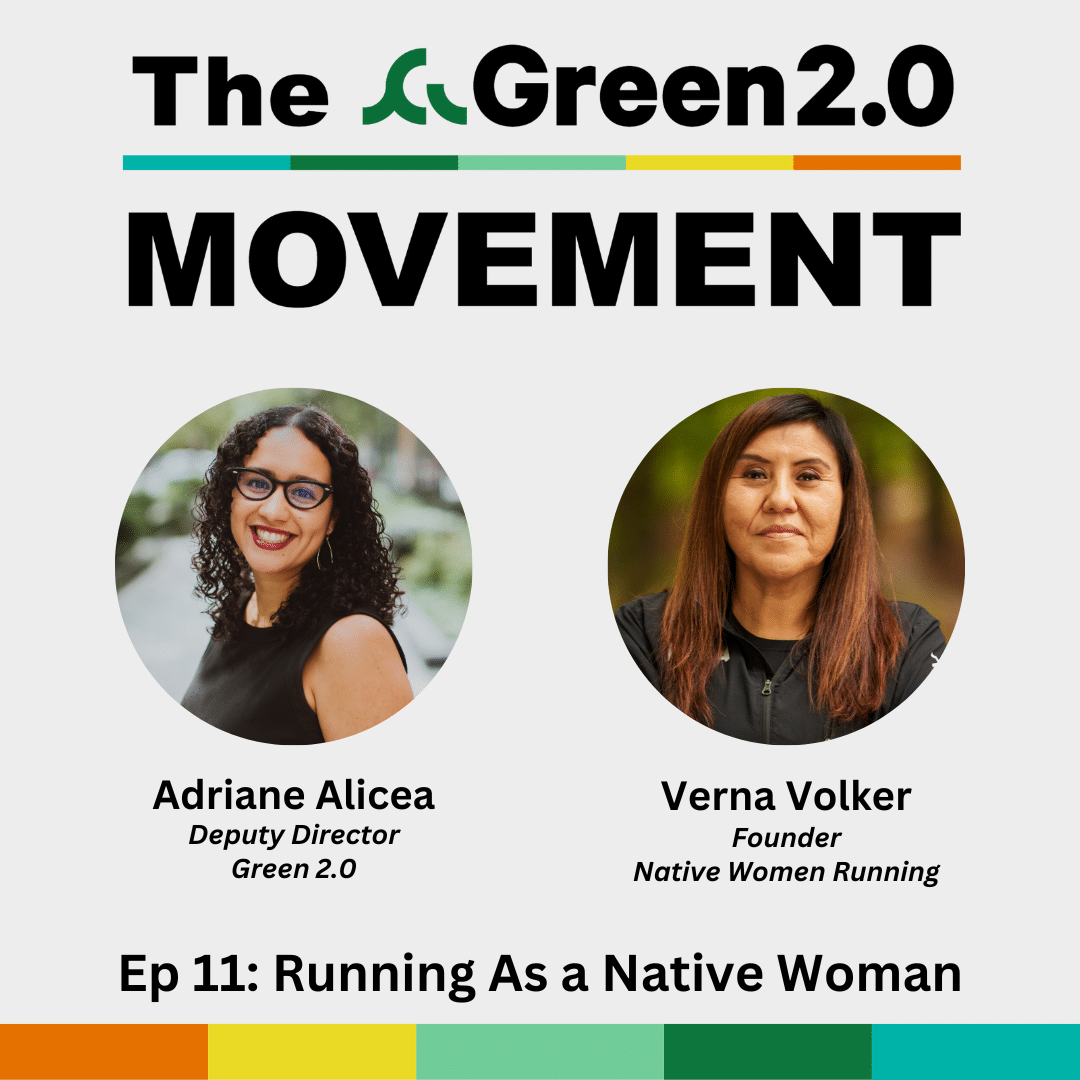
EP 11: Running as a Native Woman
Running is an opportunity to explore and connect with the environment. However inequitable access and unnecessary barriers make it difficult for many Native runners to enter the sport, especially Native women.
Adriane Alicea, Deputy Director of Green 2.0, speaks with Verna Volker, Founder of Native Women Running, about the challenges facing Native women's access to races, including the spiritual connection to running and the importance of community in the space.
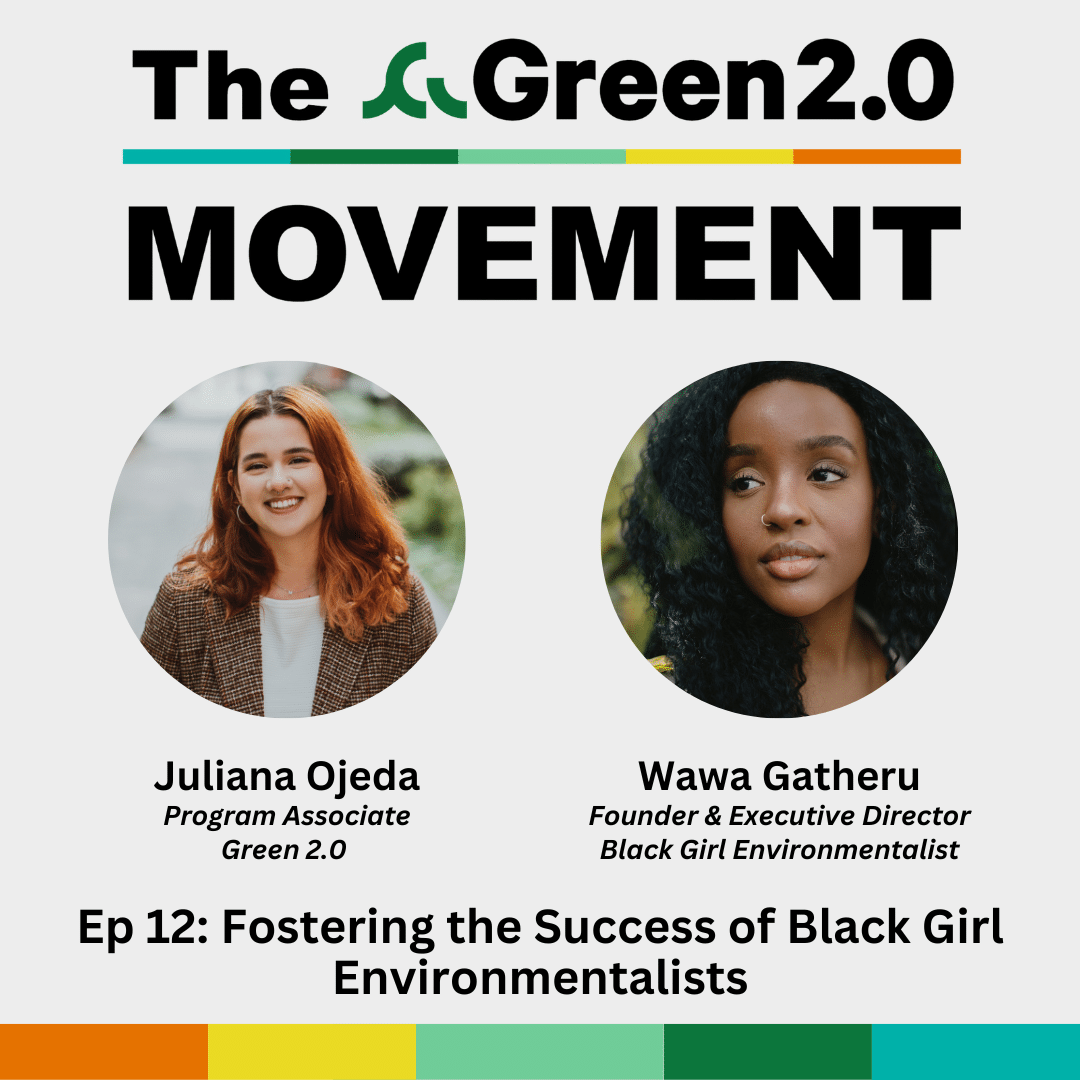
EP 12: Fostering the Success of Black Girl Environmentalists
Black women and Black gender-expansive people are indispensable contributors to effective climate solutions but they are vastly under-resourced in the green workforce.
In the final episode of Season One of the podcast, Green 2.0’s Juliana Ojeda talks with Wawa Gatheru, Founder and Executive Director of Black Girl Environmentalist, about how to address this shortcoming and create an inclusive space within the environmental movement.

